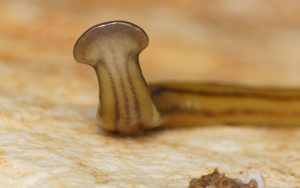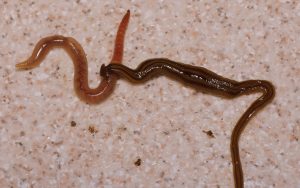Before you get too frightened the ‘Giant’ worms invading France are less than half a meter in length and while they are meat-eaters they mostly eat other, more familiar worms. However that doesn’t mean that they aren’t a big problem.
What we’re talking about are Hammerhead Flatworms, see images below. Creatures that are native to Asia but that have been unintentionally been brought to Europe and have now become established in southern France. This news raises two important issues, how human activity has enabled invasive species to harm environments around the world and, what do we actually mean when we talk about worms?


I’ll consider the second issue first. We humans tend to call any small creature that is long and narrow with no noticeable appendages, legs or head or etc., a worm. Now the typical earthworm that we can dig up in our backyard and use as bait when we go fishing is a species, in fact an entire class of species within the phylum Annelid, the segmented worms, see image below.

While Annelid worms may look simple on the outside they are really rather complex creatures with a full range of internal organs including both a circulatory and respiratory system. Indeed the internal structure of the segmented worms is so similar to that of the Arthropods, insects and crustaceans etc., that the two phyla are considered to be evolutionary cousins.
On the other hand the animals invading France are Flatworms, members of the phylum Platyhelminthes which are far simpler creatures having no internal body cavity at all. Without either a circulatory or respiratory system flatworms have to be flat because every cell in their body has to be near its skin surface in order to get its oxygen from the outside world.
So from now on we should all bear in mind that ‘worm’ can really mean a lot of very different animals, segmented worms, flatworms and oh, there is an entire phylum of roundworms as well.
So now let’s consider the problem of species of animals that ‘ride along’ with human beings as we travel around the world. These creatures often establish themselves in new environments were they have no natural predators to keep them in check so they breed out of control and end up destroying many native species. Examples of this phenomenon are so numerous I’ll only mention a few.
Before humans came, the island of Guam had no snakes so many of the species of birds there evolved to nest on the ground. Once Humans brought some snakes as pets a few got loose and within just a couple of decades all those birds were extinct, which actually hurt the snakes themselves as they had destroyed their own food source.
Right now the Asian carp is an invasive species spreading throughout the Mississippi river region and that are now threatening to get into the Great Lakes. The carp simply crowd out more valuable, well to us more valuable, native fish species destroying both recreational and industrial fishing wherever they spread. Also the carp have the habit of jumping out of the water whenever they are startled which has actually caused injuries to a few people. The image below shows how violent this habit can be.

The surprising thing about the Hammerhead Flatworms in France is that gardeners in southern France have been telling the ‘smart’ professional biologists about the flatworms for a couple of decades but the professionals weren’t really listening. Yes, the scientists admitted, some of these animals could hitch a ride on shipments of vegetables and fruit from south Asia but they couldn’t survive in France’s colder climate. This is one actual case where the professional scientists should have paid more attention to the ordinary, average person.
And the Hammerhead Flatworms are more than a slight embarrassment, they do real damage. You see the native segmented worms are responsible for a lot of the aeration and mixing of the soil we use for agriculture. Studies have shown that fields without earthworms are as much as 10% less productive.
Since the Hammerhead Flatworms can quickly decimate the earthworm population in an area we could be dealing with a very big problem. Any program to eradicate the flatworms would be very expensive and would probably still have little effect. Scientists are at least now determined to keep a closer watch on these creatures to see how quickly and how far they spread along with getting a better idea of the damage they do.
We like to think that we rule this world and take advantage of other creature for our purposes but the Hammerhead Flatworms are just one more example of how other species can sometimes take advantage of us for their purposes.
